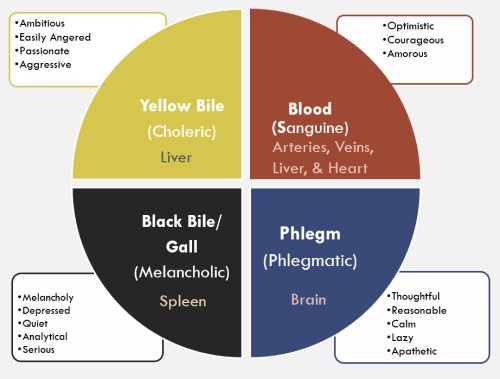What are the causes of mal-temperament?
Part 2

Based on Iranian-Islamic traditional medicine, temperament - or to use the Persian term Mizaj - is regarded as the excess or lack of warmness and humidity in one’s body and is categorized into four qualities of warmness, coldness, dryness and wetness.
Accordingly, depending on qualities which are dominant in the body they are classified into nine categories: warm, cold, wet, dry, warm and dry, warm and wet, cold and dry, cold and wet, and moderate (when none of the qualities are dominant).
As mentioned in the previous article each individual is born with a main or inherent Mizaj, and keeping the main Mizaj within its normal range of the warmness and humidity one is born with is of the essence to remain healthy.
Spoiling one’s inherent or main Mizaj and moving towards excessive warmness, coldness, wetness or dryness, would undermine the persons' health. So one must take immediate action by recognizing the factors causing such symptoms and prevent them from developing.
In case one fails to keep his/her Mizaj within its normal range for a long time, mal-temperament will strike the body and diseases will progress. Reasons as to why one might experience excessive coldness or warmness were outlined in previous article. The causes of excessive dryness and wetness are listed below.
Excessive dryness
Below is the list of reasons one might suffer conditions sparked by excessive dryness:
Factors contributing to increased warmness, such as being adjacent to fire, intense activities and heavy exercise which raise the warmness and correspondingly deplete the body of its natural humidity
Being stressed out, overexcited, and feeling ecstasy as well as being preoccupied and sleep deprived
Dry climate and seasons such as summer and autumn and residing in dry areas such as mountains and deserts
Construction jobs and pottery and being in close contact with soil, stone and building materials
Being in close contact with paint and solvents especially painters and those working in labs
Consuming food stuff with dry Mizaj such as vinegar or salt, or applying volatile substances such as oil, gasoline, alcohol, ether, acetone, hair color and nail polish topically
Not eating much (fasting for long time) as the body is unable to gain and maintain normal level of humidity
It is worth mentioning that thin people with dry and cold and dry and warm Mizaj are more likely to suffer from excessive dryness.
Excessive wetness
On the other hand some actions and eating some foods and drinks can lead to excessive wetness in the body.
Lack of movement and not taking exercise which would cause excessive wetness built up in the body, getting swollen and puffy and not being able to rid of it
Staying long in wet places such as bath or swimming pool
Wet climate or seasons such as spring and winter or residing in coastal areas
Being in close contact with water, for instance by working in paddy fields, teaching swimming, or being a lifeguard
Consuming too much food and drinks with wet Mizaj such water, dairy products, vinegar, sour food, lettuce, peach, and nectarine as well as rubbing oils with wet Mizaj such as violet oil
Overeating as the digestive system is not capable of converting the food into energy properly and that unwanted materials and humidity will build up in the body
Decrease in the amount of body waste (sweat, menstrual fluid, urine, feces) discharged from the body which causes excessive wetness in the body
Again, overweight people with wet Mizaj are more prone to suffer excessive wetness.
Seyed Mahdi Mirghazanfari, MD, holds a PhD degree in medical physiology and is an Iranian-Islamic traditional medicine researcher. He is also an assistant professor in AJA University of Medical Sciences, Tehran.
MQ/MG
